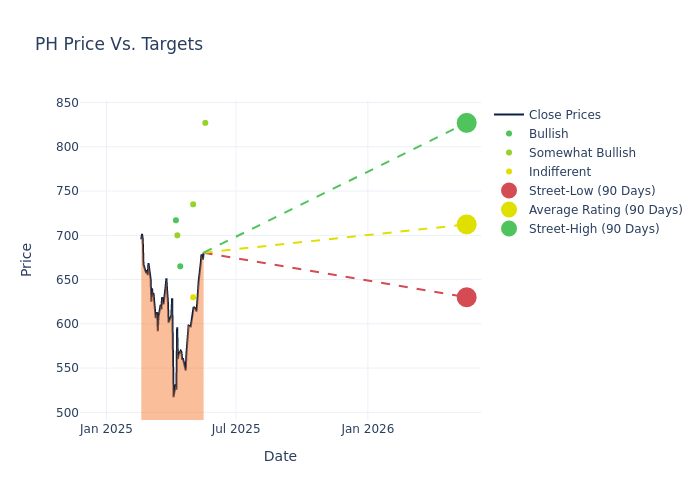What Analysts Are Saying About Parker Hannifin Stock
10 analysts have expressed a variety of opinions on Parker Hannifin (NYSE:PH) over the past quarter, offering a diverse set of opinions from bullish to bearish.
The table below offers a condensed view of their recent ratings, showcasing the changing sentiments over the past 30 days and comparing them to the preceding months.
| Bullish | Somewhat Bullish | Indifferent | Somewhat Bearish | Bearish | |
|---|---|---|---|---|---|
| Total Ratings | 2 | 6 | 2 | 0 | 0 |
| Last 30D | 0 | 1 | 0 | 0 | 0 |
| 1M Ago | 0 | 1 | 1 | 0 | 0 |
| 2M Ago | 2 | 2 | 1 | 0 | 0 |
| 3M Ago | 0 | 2 | 0 | 0 | 0 |
Analysts have recently evaluated Parker Hannifin and provided 12-month price targets. The average target is $710.2, accompanied by a high estimate of $827.00 and a low estimate of $564.00. Highlighting a 5.48% decrease, the current average has fallen from the previous average price target of $751.40.

Deciphering Analyst Ratings: An In-Depth Analysis
A clear picture of Parker Hannifin's perception among financial experts is painted with a thorough analysis of recent analyst actions. The summary below outlines key analysts, their recent evaluations, and adjustments to ratings and price targets.
| Analyst | Analyst Firm | Action Taken | Rating | Current Price Target | Prior Price Target |
|---|---|---|---|---|---|
| David Raso | Evercore ISI Group | Raises | Outperform | $827.00 | $824.00 |
| Jeffrey Hammond | Keybanc | Raises | Overweight | $735.00 | $690.00 |
| Nathan Jones | Stifel | Raises | Hold | $630.00 | $564.00 |
| Andrew Kaplowitz | Citigroup | Lowers | Buy | $665.00 | $795.00 |
| Nathan Jones | Stifel | Lowers | Hold | $564.00 | $691.00 |
| Julian Mitchell | Barclays | Lowers | Overweight | $700.00 | $750.00 |
| Jamie Cook | Truist Securities | Lowers | Buy | $717.00 | $842.00 |
| Jeffrey Hammond | Keybanc | Lowers | Overweight | $690.00 | $790.00 |
| Julian Mitchell | Barclays | Lowers | Overweight | $750.00 | $791.00 |
| David Raso | Evercore ISI Group | Raises | Outperform | $824.00 | $777.00 |
Key Insights:
- Action Taken: Analysts respond to changes in market conditions and company performance, frequently updating their recommendations. Whether they 'Maintain', 'Raise' or 'Lower' their stance, it reflects their reaction to recent developments related to Parker Hannifin. This information offers a snapshot of how analysts perceive the current state of the company.
- Rating: Offering insights into predictions, analysts assign qualitative values, from 'Outperform' to 'Underperform'. These ratings convey expectations for the relative performance of Parker Hannifin compared to the broader market.
- Price Targets: Understanding forecasts, analysts offer estimates for Parker Hannifin's future value. Examining the current and prior targets provides insight into analysts' changing expectations.
Considering these analyst evaluations in conjunction with other financial indicators can offer a comprehensive understanding of Parker Hannifin's market position. Stay informed and make well-informed decisions with our Ratings Table.
Stay up to date on Parker Hannifin analyst ratings.
Get to Know Parker Hannifin Better
Parker Hannifin started out in 1917 as Parker Appliance, selling pneumatic brakes. Through the acquisition of branded components, the firm has expanded into aerospace engines, agricultural and construction machinery, freight and passenger vehicles, and industrial automation equipment. Within these larger systems, Parker sells a wide array of small, critical pieces such as hydraulic, electromechanical, climate control, and filtration components. Many of its products are designed to work together, resulting in a high rate of cross-selling.
Parker Hannifin's Economic Impact: An Analysis
Market Capitalization Analysis: With an elevated market capitalization, the company stands out above industry averages, showcasing substantial size and market acknowledgment.
Negative Revenue Trend: Examining Parker Hannifin's financials over 3M reveals challenges. As of 31 March, 2025, the company experienced a decline of approximately -2.25% in revenue growth, reflecting a decrease in top-line earnings. As compared to competitors, the company encountered difficulties, with a growth rate lower than the average among peers in the Industrials sector.
Net Margin: Parker Hannifin's net margin excels beyond industry benchmarks, reaching 19.37%. This signifies efficient cost management and strong financial health.
Return on Equity (ROE): Parker Hannifin's ROE surpasses industry standards, highlighting the company's exceptional financial performance. With an impressive 7.25% ROE, the company effectively utilizes shareholder equity capital.
Return on Assets (ROA): The company's ROA is a standout performer, exceeding industry averages. With an impressive ROA of 3.36%, the company showcases effective utilization of assets.
Debt Management: Parker Hannifin's debt-to-equity ratio is notably higher than the industry average. With a ratio of 0.7, the company relies more heavily on borrowed funds, indicating a higher level of financial risk.
How Are Analyst Ratings Determined?
Ratings come from analysts, or specialists within banking and financial systems that report for specific stocks or defined sectors (typically once per quarter for each stock). Analysts usually derive their information from company conference calls and meetings, financial statements, and conversations with important insiders to reach their decisions.
Beyond their standard evaluations, some analysts contribute predictions for metrics like growth estimates, earnings, and revenue, furnishing investors with additional guidance. Users of analyst ratings should be mindful that this specialized advice is shaped by human perspectives and may be subject to variability.
Breaking: Wall Street's Next Big Mover
Benzinga's #1 analyst just identified a stock poised for explosive growth. This under-the-radar company could surge 200%+ as major market shifts unfold. Click here for urgent details.
This article was generated by Benzinga's automated content engine and reviewed by an editor.